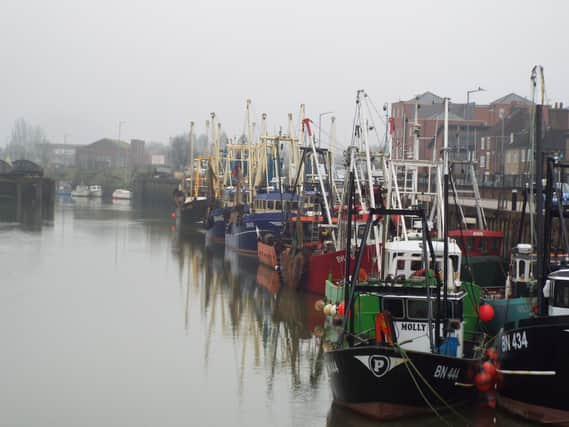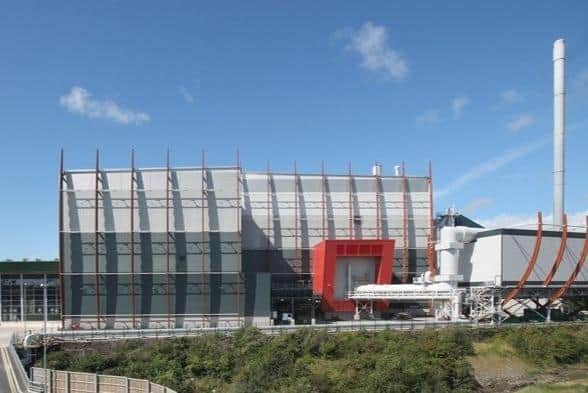‘This is going to have a disastrous effect’ – Boston fishing fleet hit out over proposed energy-from-waste facility


The Boston and Fosdyke Fishing Society has spoken out over the proposed Boston Alterative Energy Facility, which would be based at the Riverside Industrial Estate, in Marsh Lane.
The society, which represents about 26 fishing vessels working from Boston, says the scheme is ‘threatening the whole viability’ of the fishing industry in the town, saying that the ‘massive strain’ of challenges such as Brexit and Covid-19 ‘pale into significance’ next to it.
Advertisement
Hide AdAdvertisement
Hide AdThe comments come in a letter to the Standard, submitted by member Lee Doughty on behalf of the society.


Under the plans, the facility would be fuelled by more than one million tonnes of so-called ‘refuse derived fuel’ per year, which is sourced from residual ‘black bag’ household waste, arriving via ship.
The society says this would mean an increase in shipping to the Port of Boston from about 400 vessels a year to more than 1,000. The disruption presented by this rise, it says, would be compounded by the vessels’ need to turn in the river.
“This is going to have a disastrous effect on the fishing fleet, and as the ships have to cross to the wrong side of the river it will be extremely dangerous,” it said.
Advertisement
Hide AdAdvertisement
Hide Ad“We have tried to work with the proposers of the project and as a solution we asked for the fleet to be re-located below the new facility, but this has been refused – in fact any compromise has been refused and we have basically been told we will have to work around them,” it added.
The proposed development – which would create about 300 jobs during construction and 125 or so once operational – has had a mixed response during the planning process.
Numerous concerns have been registered over the plans, from local residents over such issues as air pollution, noise, and odour, but also bodies including the Environment Agency, on such grounds as flood risk and the impact on marine ecology.
In July, members of Lincolnshire County Council’s planning and regulation committee voted in favour of the proposals, against officer recommendations.
Advertisement
Hide AdAdvertisement
Hide AdIn its representation, Boston Borough Council said: “As a general position statement, the council remains broadly supportive of the development, and believes that it can have a significant positive impact for the town, subject to any adverse impacts being appropriately eliminated or mitigated.”
The society was unequivocal, however – it questioned the apparent benefits of the scheme, saying that while jobs would be created, they would also be lost, and labelled energy-from-waste as ‘very inefficient’. They also spoke of environmental concerns.
“It will not increase employment in the town, but destroy one of the oldest industries in Boston and cost jobs, pollute the air (which inevitably will be taken up by the crops in the local fields and into the food chain), and discharge who-knows-what sort of chemicals into the river and on into The Wash, one of the most highly designated marine sites in Europe,” it said.
“This plant is not environmentally friendly, it will be an environmental disaster and the people of Boston and surrounding area should say ‘no, we do not want the country’s waste brought to our town to be burnt and pollute our air and water and farmland’.”
Advertisement
Hide AdAdvertisement
Hide AdThe society also criticised the borough council for not coming to the defence of the town’s fishing industry in its representation, saying: ‘we are not even an afterthought’.
It calls for a public inquiry into the matter or referendum and members are supporting a petition set up in recent days against the plans (it can be found at tinyurl.com/BAWFPetition).
The proposals are currently with the Government’s Planning Inspectorate. Members of the public can have their say on the scheme at tinyurl.com/BAWFPlanningInspectorate
A spokesman said: “The Planning Inspectorate always encourages local people and communities to become involved in the examination of projects that may affect them.”
Advertisement
Hide AdAdvertisement
Hide AdThe Standard shared the society’s concerns with the team behind the development:
* In response to the potential impact of increased shipping, they said: “Although higher than the current vessel numbers in The Haven, historically there has been over 1,300 vessels arriving at the Port of Boston per year.”
“The applicant has looked closely at the proposed vessel movements and liaised with the fishermen and the Port of Boston on this matter,” they added. “We are confident that all users of the Haven can co-exist when the facility is operational. In order to prevent any significant disruption or delays to the fishing vessels and other users of The Haven, a Navigation Management Plan is proposed to ensure safety and commercial harmony.”
* Over re-locating the fleet, they said: “The applicant assessed the potential for providing a new wharf for the fishermen’s use further downstream in The Haven. The outcome of the review was that re-location would not be practicable given (amongst other things) the environmental, permitting and land issues for any such new development.”
Advertisement
Hide AdAdvertisement
Hide Ad“The applicant appointed Anatec to produce an independent report on impacts; they agreed that the harm on fishermen could be mitigated,” they added.
* In defence of energy-from-waste, they said: “The recovery of energy from the combustion of waste forms an important element of waste management strategy in England. As a nation we have to recognise that there is a waste issue and by providing this facility we will generate 80MW of energy, which is equivalent to the need from approximately 170,000 homes. This will contribute to a secure and reliable supply of electricity in the UK.”
They added the facility would: contribute to the UK’s circular economy, reduce the amount of waste sent to landfill, use by-products from the energy-from-waste process to manufacture a lightweight aggregate for use in the construction industry, and also capture some of the carbon dioxide produced for use in various industries.
* In response to environmental concerns, they said: “Emissions to atmosphere from the facility would be stringently regulated by the Environment Agency through an Environmental Permit and this would stipulate that monitoring is undertaken to prove that emissions comply with safe limits. These limits are set to protect public health and the wider environment. The air quality assessment work that the applicant has carried out and submitted with the Development Consent Order Application has demonstrated that all legally-set ambient air quality limits would be complied with and that any deposition of pollutants to land and potential uptake in crops would not cause significant effects, even under the very worst-case, unrealistic conditions. The distance between the facility and The Wash means that the dispersion and dilution of residual emissions in the atmosphere would not have any significant effects.”
Advertisement
Hide AdAdvertisement
Hide Ad“No direct discharges of surface water, chemicals or foul water will be made to The Haven or The Wash,” they added.
Boston Borough Council said: “The council considers that the proposal has potential to derive significant employment, bring inward investment and improve economic conditions, create a number of skilled jobs and create a positive legacy for the town. It would also resolve a national issue relating to waste and contribute to renewable energy targets. The council does, however, recognise that there are other issues which must also be weighed in the overall balance, and that determination rests with the Inspector, as the council are only a consultee, in a similar vein to the fishermen.”